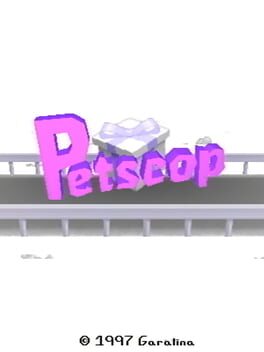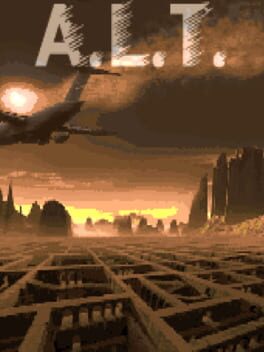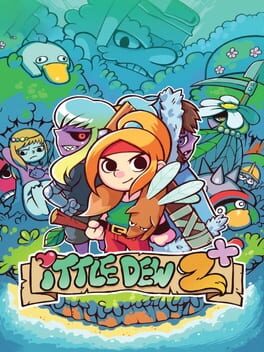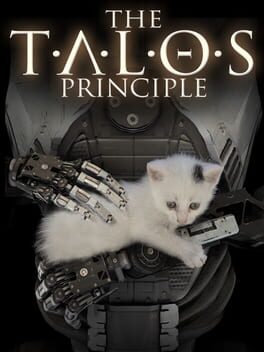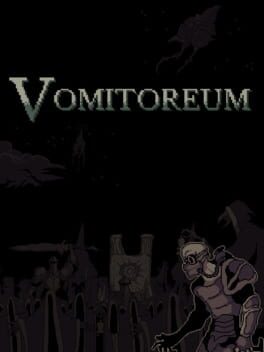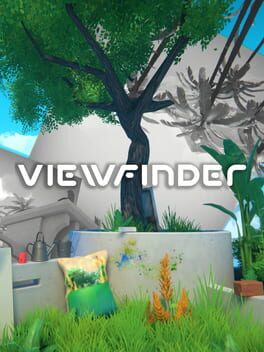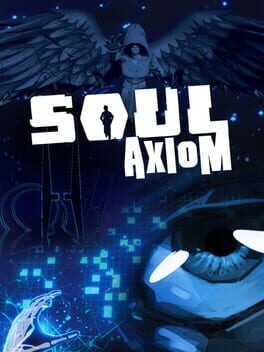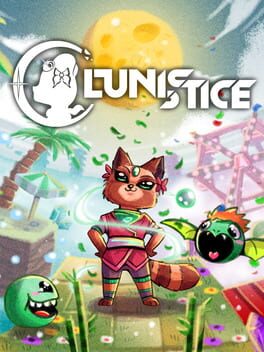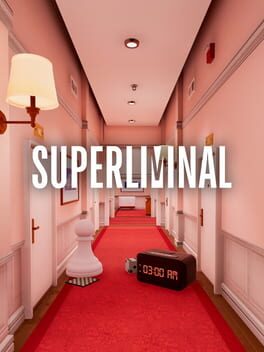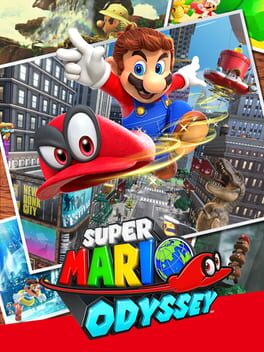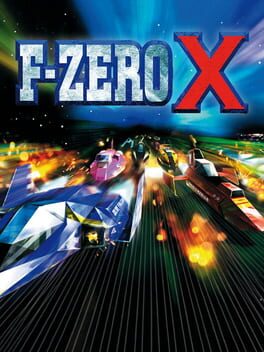ellaguro
TBD
one of the defining pieces of cinema of the 21st century
listen to me talk about Petscop with youtuber David Stockdale (aka Nightmare Masterclass) on my old podcast The Blood Zone here: https://thebloodzone.libsyn.com/04-thats-a-dead-kid
listen to me talk about Petscop with youtuber David Stockdale (aka Nightmare Masterclass) on my old podcast The Blood Zone here: https://thebloodzone.libsyn.com/04-thats-a-dead-kid
2023
2012
the greatest Doom wad of all-time - more than a Doom wad, really. one of the great games of the 2010's in general. a confoundingly multi-faceted piece of art, with some questionable bits that only enhance the mystery. a poetic statement about the nature of memory and death presented in the context of a Doom fan wad. more fun than you think it's going to be from what i just said in the previous sentence. weirdly coherent for a set with so many different authors. has more creativity in a lone fingernail than many commercial games have in their entire body. i know games don't have bodies, i'm just speaking metaphorically here.
i wrote TWO articles about this wad, so you know i have a healthy relationship with it. see my article in Vice from several years ago about it: https://www.vice.com/en/article/paq5bz/alt-doom-mod-stalker
and my older post on Unwinnable about it: https://unwinnable.com/2013/10/24/lost-worlds-a-l-t/
i wrote TWO articles about this wad, so you know i have a healthy relationship with it. see my article in Vice from several years ago about it: https://www.vice.com/en/article/paq5bz/alt-doom-mod-stalker
and my older post on Unwinnable about it: https://unwinnable.com/2013/10/24/lost-worlds-a-l-t/
2016
a low-key great Zelda game - with a slightly bigger emphasis on puzzles and some (at times) shockingly difficult combat. it was also designed (afaik) by Daniel Remar, who did iji and Hero Core back in the day, among other things.
Ittle Dew 2’s plot has basically like a goofy webcomic/has an edgy flash game of the 2000’s sort of sensibility - really just enough to justify everything else in the game. it's not something that is trying to immerse you in deep atmosphere and lore. it probably felt a little out of step with everything when the game came out originally in late 2016 (it’s apparently also on the Switch with the “+” update which it came out later for). the overworld is definitely smaller and way less meandering than some other Zelda clones, arguably also a bit generic.. at least at first, though the weirdness sort of reveals itself as you go on.
the dungeons themselves are not particularly big either - everything moves along really quickly. the first official dungeon was themed like an art gallery, which i had never seen before in a game like this. i also like that the tutorial level was a pillow fort. this third dungeon was sewer/garbage themed and i liked the frowning garbage bags. in general, i really appreciate the commitment to detail in trying to make the themes of these dungeons distinct from each other.
but be forewarned - the difficulty really does spike a lot more than you'd think! especially with some of the boss battles - you have to do some real deal Soulsborne style pattern memorization to get through them. and the puzzles can be a lot more difficult than you'd expect them to be at times.
in general, there is a sense of character and personality to each of the areas in the game that i really like. it’s not original or groundbreaking but it feels much tighter and confident in its design ideas and less interested in like a sort of bombastic presentation. i guess that’s consistent with the rest of Daniel Remar’s work. his experience as a designer almost certainly helped the game feel tighter and more confident.
one other interesting thing about this game is that you can do the dungeons in any order you like. i pretty much stuck to the original order. but it means all the puzzles in the dungeons can be completed by just a default items and they’re only made easier by items you receive later on. this is an odd choice - though not one that ruins the experience by any means. it kinda just adds to the weird idiosyncrasies of this game, if anything. and the “+” update includes this optional dream world zone where the puzzles are more challenging and quite frankly completely destroyed my brain and i never got super far into.
anyway the game may look a bit too generic or too webcomicky for some, but it has a lot of character. i think it's a good antidote to a lot of like higher production value indies with much more substantial presentation that end up lacking in that kind of character. and i also appreciate how much more it values my time than a lot of other games like this, while still having genuinely challenging and difficult moments as it ramps up towards the end. so overall - it’s not revolutionizing anything but it is really well done for what it is.
Ittle Dew 2’s plot has basically like a goofy webcomic/has an edgy flash game of the 2000’s sort of sensibility - really just enough to justify everything else in the game. it's not something that is trying to immerse you in deep atmosphere and lore. it probably felt a little out of step with everything when the game came out originally in late 2016 (it’s apparently also on the Switch with the “+” update which it came out later for). the overworld is definitely smaller and way less meandering than some other Zelda clones, arguably also a bit generic.. at least at first, though the weirdness sort of reveals itself as you go on.
the dungeons themselves are not particularly big either - everything moves along really quickly. the first official dungeon was themed like an art gallery, which i had never seen before in a game like this. i also like that the tutorial level was a pillow fort. this third dungeon was sewer/garbage themed and i liked the frowning garbage bags. in general, i really appreciate the commitment to detail in trying to make the themes of these dungeons distinct from each other.
but be forewarned - the difficulty really does spike a lot more than you'd think! especially with some of the boss battles - you have to do some real deal Soulsborne style pattern memorization to get through them. and the puzzles can be a lot more difficult than you'd expect them to be at times.
in general, there is a sense of character and personality to each of the areas in the game that i really like. it’s not original or groundbreaking but it feels much tighter and confident in its design ideas and less interested in like a sort of bombastic presentation. i guess that’s consistent with the rest of Daniel Remar’s work. his experience as a designer almost certainly helped the game feel tighter and more confident.
one other interesting thing about this game is that you can do the dungeons in any order you like. i pretty much stuck to the original order. but it means all the puzzles in the dungeons can be completed by just a default items and they’re only made easier by items you receive later on. this is an odd choice - though not one that ruins the experience by any means. it kinda just adds to the weird idiosyncrasies of this game, if anything. and the “+” update includes this optional dream world zone where the puzzles are more challenging and quite frankly completely destroyed my brain and i never got super far into.
anyway the game may look a bit too generic or too webcomicky for some, but it has a lot of character. i think it's a good antidote to a lot of like higher production value indies with much more substantial presentation that end up lacking in that kind of character. and i also appreciate how much more it values my time than a lot of other games like this, while still having genuinely challenging and difficult moments as it ramps up towards the end. so overall - it’s not revolutionizing anything but it is really well done for what it is.
2014
a more chill version of The Witness (even tho it came before). generally loved the puzzle design and the overall atmosphere of the different worlds. never remotely cared about the story, tho. i guess i could have skipped the terminals, but i kept thinking maybe i'd finally get into them even tho that never happened.
2021
i think i felt more positive about this from the outset that i ended up doing in hindsight. the visual style is obviously the highlight here - and it is good, especially in particular areas. there is something nice about wandering through weird cartoony labyrinths in a Metroid format but still obviously in first person in the Doom engine. and it does feel like something that had a lot of heart put into it. even if it’s pretty short, it’s solidly executed. and there were areas that felt distinct, with some new surprises or interesting traits.
there are really times where felt like it could use more work or it just didn’t feel that refined - some areas were a bit empty, there were a few times where it felt buggy or overly grindy or there were random death traps for no reason, and a lot of the bosses were just “circle strafe and hold down fire to win” - in general there’s not exactly deep inspiring combat. it’s definitely a game that just runs in the Doom engine - you even get the Doom percentage stat screen at the end of the game. the plot is a bit like a Dark Souls fanfiction and feels amateurish at times.
my big complaint is the design feels a bit boilerplate outside of the cool visuals - very workmanlike, which is fine! in that way it made me think a little of older indie game designers like Locomalito or Daniel Remar who sort of have a retro sensibility aren’t exactly doing anything revolutionary in terms of design features in their games or whatever (Locomalito literally advertises his work as “traditional video games” which is... lol), but their games still have a distinctive mark. tho it is less refined design-wise than the output of those designers. but still it’s obviously coming from a developer with limited resources and time - and that is part of the charm. it reminds me of a lot of 00's games in that way.
but if you're expecting something more weird or off the beaten path due to the visuals, you're not really going to get that here. i wouldn't exactly call it an essential play for that reason, even if there were individual parts i liked.
there are really times where felt like it could use more work or it just didn’t feel that refined - some areas were a bit empty, there were a few times where it felt buggy or overly grindy or there were random death traps for no reason, and a lot of the bosses were just “circle strafe and hold down fire to win” - in general there’s not exactly deep inspiring combat. it’s definitely a game that just runs in the Doom engine - you even get the Doom percentage stat screen at the end of the game. the plot is a bit like a Dark Souls fanfiction and feels amateurish at times.
my big complaint is the design feels a bit boilerplate outside of the cool visuals - very workmanlike, which is fine! in that way it made me think a little of older indie game designers like Locomalito or Daniel Remar who sort of have a retro sensibility aren’t exactly doing anything revolutionary in terms of design features in their games or whatever (Locomalito literally advertises his work as “traditional video games” which is... lol), but their games still have a distinctive mark. tho it is less refined design-wise than the output of those designers. but still it’s obviously coming from a developer with limited resources and time - and that is part of the charm. it reminds me of a lot of 00's games in that way.
but if you're expecting something more weird or off the beaten path due to the visuals, you're not really going to get that here. i wouldn't exactly call it an essential play for that reason, even if there were individual parts i liked.
2023
it’s a One Clever Mechanic (1CM) game in 2023! imagine that! i really thought this genre died in 2019, so much so that i was actually kind of glad to see another one of these.
in many ways this game really perfectly embodies the sort of prestige puzzle game tropes often published by Annapurna (tho this is, notably, not) or The Witness. the game is in first person and the puzzles rely on one gimmick of placing photographs over a landscape and having that landscape change (the One Clever Mechanic aka 1CM in this example) - honestly which is a cool technical gimmick. especially when you start using pictures or photos that are not just of a landscape but are a bit more abstract, which this game ends up doing a lot of.
this also went viral a bit for a clip of Vinny Vinesauce muting the voice acting right from the start. that was a good move. i also quickly muted the voice acting. the story was not particularly interesting or good to me - at least at first - until the end when the world seemed to echo what was going on in the story a little more and it wasn't just flavor text. i'm not sure i was ever fully invested, but it at least made the stakes feel a lot greater. the also game does the “you can pet the cat” thing to an annoying degree. maybe this is the gamedev twitter pilled version of a One Clever Mechanic game instead of a puzzle mans version. more of a “i’m sensitive” Gen Z/Millennial sort of way vs. a “you’re simply too unintelligent and i’m optimizing you out of my reality” Gen X tech guy way lol.
on a positive side, the setting is pretty nicely realized. it’s very approachable and pleasant looking and without the slightly generic cardboard style of The Witness or whatever. while they're not as strong to me as other games in this genre (i.e. The Witness or Superliminal) i do think the puzzles get steadily better as the game goes on. things were feeling a bit Myst like to me at the end in terms of being this kind of abstract symbolic world of the mystery. the various technical gimmicks really help carry them through.
all in all, i’m more positive than negative about this game. it’s not going to sway you if you don’t already like these sorts of puzzle games, and i don't think it has the strongest puzzles of them. but i also felt like the story tried to go places that The Witness or Superliminal didn't, and actually grapple with the nature of this genre in a more interesting way. so even if there are some tropes that annoy me (the dialogue or the "you can pet the cat" thing) i felt like this game had more to say about itself in the end than i expected.
in many ways this game really perfectly embodies the sort of prestige puzzle game tropes often published by Annapurna (tho this is, notably, not) or The Witness. the game is in first person and the puzzles rely on one gimmick of placing photographs over a landscape and having that landscape change (the One Clever Mechanic aka 1CM in this example) - honestly which is a cool technical gimmick. especially when you start using pictures or photos that are not just of a landscape but are a bit more abstract, which this game ends up doing a lot of.
this also went viral a bit for a clip of Vinny Vinesauce muting the voice acting right from the start. that was a good move. i also quickly muted the voice acting. the story was not particularly interesting or good to me - at least at first - until the end when the world seemed to echo what was going on in the story a little more and it wasn't just flavor text. i'm not sure i was ever fully invested, but it at least made the stakes feel a lot greater. the also game does the “you can pet the cat” thing to an annoying degree. maybe this is the gamedev twitter pilled version of a One Clever Mechanic game instead of a puzzle mans version. more of a “i’m sensitive” Gen Z/Millennial sort of way vs. a “you’re simply too unintelligent and i’m optimizing you out of my reality” Gen X tech guy way lol.
on a positive side, the setting is pretty nicely realized. it’s very approachable and pleasant looking and without the slightly generic cardboard style of The Witness or whatever. while they're not as strong to me as other games in this genre (i.e. The Witness or Superliminal) i do think the puzzles get steadily better as the game goes on. things were feeling a bit Myst like to me at the end in terms of being this kind of abstract symbolic world of the mystery. the various technical gimmicks really help carry them through.
all in all, i’m more positive than negative about this game. it’s not going to sway you if you don’t already like these sorts of puzzle games, and i don't think it has the strongest puzzles of them. but i also felt like the story tried to go places that The Witness or Superliminal didn't, and actually grapple with the nature of this genre in a more interesting way. so even if there are some tropes that annoy me (the dialogue or the "you can pet the cat" thing) i felt like this game had more to say about itself in the end than i expected.
2014
(reviewing the original version since i'm not sure the rebooted one is much different). a messy passion project that somehow managed to be way more than the sum of its parts to me. listen to my episode of my old podcast The Blood Zone to hear me talk more about it: https://thebloodzone.libsyn.com/02-trapped-inside-a-soul-cube
are the puzzles altogether that interesting? no. you do a lot of fairly boilerplate puzzles with a few different hand manpulation powers. do a lot of settings feel like template Indie Game mixed with glossy NFT sorta art? yes. although there is a hazy dreaminess to the world which complicates this somewhat. is the plot remotely coherent? hell no. but it has a sort of Southland Tales level of really really trying to say something about something in a bizarre and idiosyncratic way.
for a walking sim with some puzzle elements, i really admire the ambition of the game. the variety of settings, all the secret areas. the way the hub map is laid out. the fact that different levels have different design gimmicks - some of which feel legitimately cool i.e. the apartment and hospital levels. there is something memorable that i keep coming back to about this game, even if it was a bit tedious at various points.
are the puzzles altogether that interesting? no. you do a lot of fairly boilerplate puzzles with a few different hand manpulation powers. do a lot of settings feel like template Indie Game mixed with glossy NFT sorta art? yes. although there is a hazy dreaminess to the world which complicates this somewhat. is the plot remotely coherent? hell no. but it has a sort of Southland Tales level of really really trying to say something about something in a bizarre and idiosyncratic way.
for a walking sim with some puzzle elements, i really admire the ambition of the game. the variety of settings, all the secret areas. the way the hub map is laid out. the fact that different levels have different design gimmicks - some of which feel legitimately cool i.e. the apartment and hospital levels. there is something memorable that i keep coming back to about this game, even if it was a bit tedious at various points.
2022
i grew up with N64 platformers and obviously have a lot of fondness for them, but this current wave of retro indie 3D platformers hasn't really excited me as much as i hoped it might. i guess it’s just not a genre i feel a great need to revisit that much outside of childhood especially now since the novelty of indie devs making this kind of game has worn off. so when i do see this kind of game, i really hope for it to add something significant or new, or at least be so tightly designed that i feel like this cannot be ignored.
in general this seems be some sort of compromise in between a N64-style collectathon that emphasizes exploration and a more Sonic-inspired speed game with more linear levels with some branching paths (which it tends to veer much more towards as the levels go on). at some level i’m not really sure i fully understand the compromise as a coherent design decision, because it’s hard for me to know whether to focus on collecting everything or just trying to beat the level as fast as possible is the better strategy, and which the game really expects you to do. over time this became less of a problem to me but i guess it goes back to the thing of a lot of indie games feeling "vibes based" the actual coherence of the ideas behind the design feeling a little loose and fussy. like it's several features of the era sort of crammed together in a nostalgic way but doesn't fully have a distinct identity of its own.
the controls were also kind of loose and oversensitive to me at first - it’s very easy to fall off surfaces accidentally and i’m not sure holding the “slow yourself down” button they try and give you for tighter jumps really alleviates that. i ended up having to turn down the movement sensitivity a lot to get through things effectively, which definitely made it better. the camera also can miss shifting at important points of the level that leads to deaths and randomly smashing into enemies you can’t see. having bigger character shadows like in Jumping Flash might help - it just felt sometimes hard to gauge exactly where you're landing, which led to a lot of cheap deaths. at least the game wasn't very punishing, but dying did feel pretty arbitrary at times.
a lot about this game would make more sense to me if this were a more tightly choreographed experience. i guess but it just generally lacks the tightness you want from a game like this - even 3D Sonic feels super tightly choreographed in comparison. it just makes everything feel a little muddled and confused, i guess, and less really conscious of what makes some of those other games work. there’s a reason why games like Crash Bandicoot or Sonic go in one direction, and games like Banjo Kazooie go in another.
that said, i do really like the sort of pleasant pastel color palette and the general visual vibe. it hits something for me that soothes me. the music is also very pleasant, and the level design gets a bit more interesting as it goes on. it seems like the developer does at least care about making a decent one of these games that functions well - this isn’t just a pure “vibes only” experience. i ended up having more fun at the end because of the general visual atmosphere/sound and the game's pace moved well enough in a way was pleasant to me.
but yeah - i might sound more harsh but overall i found this to be a pleasant, if not super memorable experience.
in general this seems be some sort of compromise in between a N64-style collectathon that emphasizes exploration and a more Sonic-inspired speed game with more linear levels with some branching paths (which it tends to veer much more towards as the levels go on). at some level i’m not really sure i fully understand the compromise as a coherent design decision, because it’s hard for me to know whether to focus on collecting everything or just trying to beat the level as fast as possible is the better strategy, and which the game really expects you to do. over time this became less of a problem to me but i guess it goes back to the thing of a lot of indie games feeling "vibes based" the actual coherence of the ideas behind the design feeling a little loose and fussy. like it's several features of the era sort of crammed together in a nostalgic way but doesn't fully have a distinct identity of its own.
the controls were also kind of loose and oversensitive to me at first - it’s very easy to fall off surfaces accidentally and i’m not sure holding the “slow yourself down” button they try and give you for tighter jumps really alleviates that. i ended up having to turn down the movement sensitivity a lot to get through things effectively, which definitely made it better. the camera also can miss shifting at important points of the level that leads to deaths and randomly smashing into enemies you can’t see. having bigger character shadows like in Jumping Flash might help - it just felt sometimes hard to gauge exactly where you're landing, which led to a lot of cheap deaths. at least the game wasn't very punishing, but dying did feel pretty arbitrary at times.
a lot about this game would make more sense to me if this were a more tightly choreographed experience. i guess but it just generally lacks the tightness you want from a game like this - even 3D Sonic feels super tightly choreographed in comparison. it just makes everything feel a little muddled and confused, i guess, and less really conscious of what makes some of those other games work. there’s a reason why games like Crash Bandicoot or Sonic go in one direction, and games like Banjo Kazooie go in another.
that said, i do really like the sort of pleasant pastel color palette and the general visual vibe. it hits something for me that soothes me. the music is also very pleasant, and the level design gets a bit more interesting as it goes on. it seems like the developer does at least care about making a decent one of these games that functions well - this isn’t just a pure “vibes only” experience. i ended up having more fun at the end because of the general visual atmosphere/sound and the game's pace moved well enough in a way was pleasant to me.
but yeah - i might sound more harsh but overall i found this to be a pleasant, if not super memorable experience.
this game is still so… i’m sorry… nostalgic for me. something about the transition of the series, and video games in general, from 2d to 3d that happened during that period. there’s a palpable sense of loss and melancholy. it’s kind of like the idea of growing up, and that you can’t return back to childhood. some things get lost in the process. games lost their innocence, and (maybe only in an implicit way) i feel like that game really grapples with the feeling. as an adult a lot of things in the world become stranger, and you’re much more aware of its problems. your horizons and responsibilities also become bigger, and you feel much more of a sense that you need to do something in the world. your relationship with people also changes, and things become more real and you see a lot of unmanifested things in those people suddenly manifest themselves. both for good and bad.
anyway i feel like it’s more potent than the “light world/dark world” metaphor of Link to the Past, even though i like that game almost as much. but Ocarina feels like it really is about a loss of childhood innocence more than the other games.
anyway i feel like it’s more potent than the “light world/dark world” metaphor of Link to the Past, even though i like that game almost as much. but Ocarina feels like it really is about a loss of childhood innocence more than the other games.
2019
this came out in late 2019 and it really feels like a summation of an entire decade of gimmicky indie “one clever mechanic” (which i also call "1cm") puzzle design of the 2010’s to me. i almost imagine this game as being a statement about that type of game in general, in some form. but perhaps that’s me imposing my own reading onto it. more recently in this genre we got Viewfinder. Superliminal is snappier and more innovative than Viewfinder. it’s more The Stanley Parable/30 Flights of Loving than a game with discrete puzzles like Viewfinder - there are bunch of different simple scenario designs that are run through at a rapid pace, and the boundaries between them are basically nonexistent. the puzzle design gimmicks go further than something like Stanley Parable also - there’s a real focus on constant mind bending moments. and that’s legitimately cool! …at least for awhile.
because it’s a constantly shifting reality, there is seemingly never any interest in making the place you’re in feel real and tangible. once you’re used to these kinds of design tropes being used over and over, they fail to really move you anymore. and the writing never really approaches being coherent or contextualizing anything you’re doing in an interesting way - because the game seemingly has no interest in that. it’s a tech demo designed to be “mind bending” and push buttons, and it does succeed at that - but it’s underwhelming if you were expecting any more from that. even like Portal or The Stanley Parable, which are pretty one-note in many ways, at least have concepts in the fiction that are more immediately graspable and relatable. a lot more tools in the toolbox were used to make Superliminal than those games - and they’re cool tools! it’s the kind of stuff the Doom wad “ALT” or some other weirder Doom levels (like “Myhouse” for that matter) do that i like, but in a hyper-concentrated form. there’s a lot to be gained from that. but it’s not really clear for what purpose they’re being used. it feels directionless. at the end of the day you're wandering a bunch of nondescript rooms and hallways that are kind of hard to pretend are anything but something there to set up the puzzles.
here’s something about this particular approach to game design - like you’re Jules Verne unraveling the mysteries of the deep, or Werner Herzog filming in the jungle. approaching game design like it’s a kind of science, something inherent to the nature of being that you’re unraveling through your curiosity. it’s something that i find both admirable and completely delusional and un-self-aware. it’s a kind of macho attitude, but for a certain type of insulated programmer nerd. games like this offered a promise of a glimpse into something deeper, but rarely surpassed going beyond “huh, that was cool i suppose” because it was coming from people who worship the idea of technological exceptionalism and were thus uninterested in contextualizing it in larger art history. the insights to be gleaned were all very polished gimmicks rubbing up against each other in a consumer-friendly package intent on planting the seed of Deep Game Design in the minds of players - because that, in itself, was somehow powerful. Videogames Matter, folks. Videogames Can Do Things! videogames are technology, and all problems with technology can be eventually brained to death.
perhaps this approach works in some ways - Braid got me back into following games, after all. but if it does it’s less so because of the end result, but merely because they’re at least attempting to be something different than a majority of games… and that at least makes them stand out from other things.
but yeah - in that way i think Superliminal really embodies a lot of design trends of that era, many of which were on their way out by the time it came out. like i said it’s more expressive and innovative than Viewfinder - but i’ll also give that game credit, i feel like that one least it was trying to say something larger with the story that this doesn’t. even if it was clumsy. i’m not sure what Superliminal has to say about anything beyond “look at what we can do”. and that’s a real bummer, because in isolation - completely removed from the context (or lack thereof) of the game, i liked a lot of things about Superliminal.
but speaking of “My House” - i feel like that takes very similar ideas and actually does the whole thing much better, because there’s a really strong sense of angst and pathos there that never is remotely in this game. that’s perhaps the direction i can imagine more of these games taking in the future - the sort of hauntology angle vs. the “i’m a great scientist unraveling the secrets of the universe” one.
because it’s a constantly shifting reality, there is seemingly never any interest in making the place you’re in feel real and tangible. once you’re used to these kinds of design tropes being used over and over, they fail to really move you anymore. and the writing never really approaches being coherent or contextualizing anything you’re doing in an interesting way - because the game seemingly has no interest in that. it’s a tech demo designed to be “mind bending” and push buttons, and it does succeed at that - but it’s underwhelming if you were expecting any more from that. even like Portal or The Stanley Parable, which are pretty one-note in many ways, at least have concepts in the fiction that are more immediately graspable and relatable. a lot more tools in the toolbox were used to make Superliminal than those games - and they’re cool tools! it’s the kind of stuff the Doom wad “ALT” or some other weirder Doom levels (like “Myhouse” for that matter) do that i like, but in a hyper-concentrated form. there’s a lot to be gained from that. but it’s not really clear for what purpose they’re being used. it feels directionless. at the end of the day you're wandering a bunch of nondescript rooms and hallways that are kind of hard to pretend are anything but something there to set up the puzzles.
here’s something about this particular approach to game design - like you’re Jules Verne unraveling the mysteries of the deep, or Werner Herzog filming in the jungle. approaching game design like it’s a kind of science, something inherent to the nature of being that you’re unraveling through your curiosity. it’s something that i find both admirable and completely delusional and un-self-aware. it’s a kind of macho attitude, but for a certain type of insulated programmer nerd. games like this offered a promise of a glimpse into something deeper, but rarely surpassed going beyond “huh, that was cool i suppose” because it was coming from people who worship the idea of technological exceptionalism and were thus uninterested in contextualizing it in larger art history. the insights to be gleaned were all very polished gimmicks rubbing up against each other in a consumer-friendly package intent on planting the seed of Deep Game Design in the minds of players - because that, in itself, was somehow powerful. Videogames Matter, folks. Videogames Can Do Things! videogames are technology, and all problems with technology can be eventually brained to death.
perhaps this approach works in some ways - Braid got me back into following games, after all. but if it does it’s less so because of the end result, but merely because they’re at least attempting to be something different than a majority of games… and that at least makes them stand out from other things.
but yeah - in that way i think Superliminal really embodies a lot of design trends of that era, many of which were on their way out by the time it came out. like i said it’s more expressive and innovative than Viewfinder - but i’ll also give that game credit, i feel like that one least it was trying to say something larger with the story that this doesn’t. even if it was clumsy. i’m not sure what Superliminal has to say about anything beyond “look at what we can do”. and that’s a real bummer, because in isolation - completely removed from the context (or lack thereof) of the game, i liked a lot of things about Superliminal.
but speaking of “My House” - i feel like that takes very similar ideas and actually does the whole thing much better, because there’s a really strong sense of angst and pathos there that never is remotely in this game. that’s perhaps the direction i can imagine more of these games taking in the future - the sort of hauntology angle vs. the “i’m a great scientist unraveling the secrets of the universe” one.
1999
officially i give this an 8.5/10 which is more like 4.25 stars but whatever.
it contains pretty much all the base ideas later games in the series had (and maybe a few more). a bit dumber than SH2 in terms of story but also maybe a bit scarier. some very stupid sewer sections and you have to do optional bullshit you can easily miss to get the good ending. i hate running away from pterodactyls and hopping humper guys. still impressive everything they managed to accomplish with a PS1 game though
it contains pretty much all the base ideas later games in the series had (and maybe a few more). a bit dumber than SH2 in terms of story but also maybe a bit scarier. some very stupid sewer sections and you have to do optional bullshit you can easily miss to get the good ending. i hate running away from pterodactyls and hopping humper guys. still impressive everything they managed to accomplish with a PS1 game though
2017
my thoughts on this game are so complicated that i don't think i could summarize here. it's such a weird and unique big mainline release in some ways. and yet it also just reinforces the inherent limitations of Mario as a character and like... global corporate mascot for the world of videogames. stuff like the New Super Mario Bros series or 3D Mario Land/World games may have fun or interesting design on a granular level but they don't really try and be anything more than what they are. and in some ways that makes them kind of bland, and safe. ofc Nintendo always releases more experimental side projects involving characters connected to the Mario universe, i.e. with WarioWare or with Mario Maker. but with this game it really seems like Nintendo tries to infuse some of that weirdness from their offshoots and shoot for the moon (pun intended i guess) and get weird and poke fun of the conventions of Mario a bit in a big mainline Mario game. and in doing so i feel like it ends up being this strange, uneven thing that i think the climate of the Switch release in 2017 and the general awed tone about Nintendo coming out of the smash success of Breath of The Wild kind of distracted from.
some of the environments bring back the surreal feeling of Mario 64. the feeling of new possibility, and that the unexpected is possible that older Mario games had sometimes creeps in from time to time. the Sonic 2006-esque New Donk City is def the highlight of the game for me, as well as the industrial forest area with the surf music that also looks like a 3D Sonic level and the two tiered structure. why does Mario suddenly feel like a 3D Sonic game in some places? who knows! it occasionally shows imaginative, anarchic glimpses of what we saw the most of in games like Mario 3, before it had really solidified what Mario was and wasn't. but then other levels (i.e. the beach one) are just your standard boilerplate Mario settings that feel like they could be in any modern 3D platformer. i don't really like the linear nature of the stage progression either and wish they did something with an actual hub world, even though i guess they sort of tried to by having secrets you could later access that connected stages. i also don't know what to make of the very self-referential nature of this game, from them bringing back Pauline from Donkey Kong to the castle in Mario 64 being its own dedicated bonus area that you're supposed to return to. it feels kind of like Nintendo's attempt to be self-reflective about the legacy of the franchise in a way that i didn't exactly expect to see in a mainline Mario game. so... points for that definitely. but ofc it doesn't go beyond a certain point with that, which invariably leaves me feeling a bit puzzled and with more questions than answers.
tl;dr There's A Lot Going On Here, and some of it works and some of it doesn't. and i'm not sure what to make of it all.
some of the environments bring back the surreal feeling of Mario 64. the feeling of new possibility, and that the unexpected is possible that older Mario games had sometimes creeps in from time to time. the Sonic 2006-esque New Donk City is def the highlight of the game for me, as well as the industrial forest area with the surf music that also looks like a 3D Sonic level and the two tiered structure. why does Mario suddenly feel like a 3D Sonic game in some places? who knows! it occasionally shows imaginative, anarchic glimpses of what we saw the most of in games like Mario 3, before it had really solidified what Mario was and wasn't. but then other levels (i.e. the beach one) are just your standard boilerplate Mario settings that feel like they could be in any modern 3D platformer. i don't really like the linear nature of the stage progression either and wish they did something with an actual hub world, even though i guess they sort of tried to by having secrets you could later access that connected stages. i also don't know what to make of the very self-referential nature of this game, from them bringing back Pauline from Donkey Kong to the castle in Mario 64 being its own dedicated bonus area that you're supposed to return to. it feels kind of like Nintendo's attempt to be self-reflective about the legacy of the franchise in a way that i didn't exactly expect to see in a mainline Mario game. so... points for that definitely. but ofc it doesn't go beyond a certain point with that, which invariably leaves me feeling a bit puzzled and with more questions than answers.
tl;dr There's A Lot Going On Here, and some of it works and some of it doesn't. and i'm not sure what to make of it all.
1998
(text copied from something i wrote in a thread elsewhere)
i remember when F-Zero X came out it seemed like no one i knew really knew about or played the game. my friend who owned a gazillion n64 games did not own it. i got it heavily discounted like a year after it came out at Funcoland and even the dude at Funcoland was like “yeah this game didn’t sell well at all” and slagged off the game a little. perhaps the barren dreamscape quality of the game, due to them having to drastically scale back world detail in order to have a smoother experience, contributed to that. but i played a ton of it. it was like Extreme-G (another n64 game my friend owned that a lot of people don’t really remember) in terms of the speed but like wayyy better executed. i read about the 64DD expansion in a magazine and was real upset it was never released here cuz i desperately wanted a track editor. i’m not even sure how much i like the OST (prefer the original SNES OST guess) but that sort of cheesy guitar stuff hits a particular feeling of wistfulness from the gaudiness of a bygone era that things like the opening theme for the tv show Red Dwarf also inspires. you can imagine a warbly degraded version playing off of a VHS tape. it’s very of a particular time and era i guess.
anyway it took me forever but i eventually did beat all cups back in the day. that's when i had a lot more time to devote to the same handful of games and didn't have a massive unplayed library and a life to live. also i'm glad there's gradually been more tolerance and acceptance for the sort of low-poly low-detail dreamscape fog worlds of the N64 era as its own sort of look and feel in the last five years or so. i wouldn't say F-Zero X is this utterly timeless experience but it's still fun and fast (and hard) and worth playing regardless.
i remember when F-Zero X came out it seemed like no one i knew really knew about or played the game. my friend who owned a gazillion n64 games did not own it. i got it heavily discounted like a year after it came out at Funcoland and even the dude at Funcoland was like “yeah this game didn’t sell well at all” and slagged off the game a little. perhaps the barren dreamscape quality of the game, due to them having to drastically scale back world detail in order to have a smoother experience, contributed to that. but i played a ton of it. it was like Extreme-G (another n64 game my friend owned that a lot of people don’t really remember) in terms of the speed but like wayyy better executed. i read about the 64DD expansion in a magazine and was real upset it was never released here cuz i desperately wanted a track editor. i’m not even sure how much i like the OST (prefer the original SNES OST guess) but that sort of cheesy guitar stuff hits a particular feeling of wistfulness from the gaudiness of a bygone era that things like the opening theme for the tv show Red Dwarf also inspires. you can imagine a warbly degraded version playing off of a VHS tape. it’s very of a particular time and era i guess.
anyway it took me forever but i eventually did beat all cups back in the day. that's when i had a lot more time to devote to the same handful of games and didn't have a massive unplayed library and a life to live. also i'm glad there's gradually been more tolerance and acceptance for the sort of low-poly low-detail dreamscape fog worlds of the N64 era as its own sort of look and feel in the last five years or so. i wouldn't say F-Zero X is this utterly timeless experience but it's still fun and fast (and hard) and worth playing regardless.
